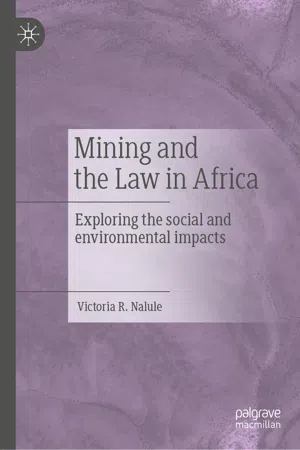The African continent is endowed with various minerals including gold , diamonds, vermiculite, manganese, cobalt, zirconium, salt, phosphate rock just to mention but a few. Mining basically refers to the extraction of coal and other substances from the earth.1 With this definition in mind, we note that broadly defined, mining includes the extraction of fossil fuels including oil, gas and coal. The discussion in this book however excludes fossil fuels and focuses on solid minerals.
The mining sector has increasingly become important due to the rising demand of some minerals such as iron ore which has prompted an increase in foreign investments.2 It is generally an acceptable principle that countries endowed with vast minerals should possess enormous wealth. Albeit this has seemed difficult in most African countries, where mineral-rich countries are among the poorest in the World—this has been described a resource curse.3 Nevertheless, if well-managed, resource-rich countries can highly benefit from their resources by exchanging and marketing their minerals with the countries which do not have in exchange for valuable currencies.4 The potential of the mining sector to contribute to the economic and social transformations of the countries is evident in countries that have managed to transition from poverty to at least middle-income status.5
Taking an example of Botswana , it has highly benefited from its mining sector and this has been attributed to the good governance system in the country. Botswana heavily relies on its mining sector which contributes a third of the country’s GDP; 50% of the country’s tax earnings and 80% of the total export. The situation is similar in countries such as Namibia and South Africa .6 However, for other African countries such as the Democratic Republic of Congo (DRC), Malawi , South Sudan—the potential of the mining industry to effectively contribute to the economic development has not been realized due to various issues including lack of advanced technology, lack of infrastructure, political instability, corruption both on the part of the mining companies and government officials. In this respect therefore, the topical issues in the African mining sector include but not limited to infrastructural development; value addition; linkages; corporate social responsibility ; local content ; environmental protection; land access and small-scale/artisanal mining .
To be able to address the issues highlighted above, we must be aware of the different forms of mining on the African continent. Mining in most African countries is carried out on both large-scale and small-scale/artisanal mining . While large-scale mining involves companies, who employ advanced technology and enormous capital to extract minerals, artisanal mining or small-scale mining (ASM) on the other hand involves the use of rudimentary methods by individuals who are not officially employed by a mining company.7 During my fieldwork research, I had a chance of visiting different mining sites where artisanal miners operate from. It is true that the ASM employs many poor people in rural areas in different parts of Africa .8 These miners use hand tools and as such are directly exposed to health challenges involved in extracting these resources. Although ASM employs over twenty million people in developing countries and formalization and legalization of ASM has been advised as the best way to address the challenges these miners face9: Much still needs to be addressed to effectively ensure that the sector operates in a sustainable manner. There are indeed various issues to be addressed when it comes to ASM, in this book the main question to be addressed is, what practical solutions should African countries employ to ensure that ASM effectively contributes to the economic development of the African countries?
Besides addressing issues associated with ASM, there have also been various reforms on the African continent to ensure that the minerals translate into benefits for the host countries and the host communities. One way of achieving this has been to closely supervise foreign companies involved in large-scale mining as evidenced in the strengthening of local content and corporate social responsibility laws and policies. Additionally, there have been reforms aimed at ensuring that African countries benefit from their minerals. Moreover, on a regional level, we recently witnessed the signing of the African Continental Free Trade Agreement on 21 March 2018.10 Indeed, regionalism has been recognized as being essential in addressing the common challenges faced on the African continent.11 In the mining sector, the continent witnessed the establishment of the African Mining Vision (AMV) a regional mechanism aimed at ensuring cooperation in the development of the mining sector in Africa . In this book, the main questions to be addressed regarding legal reforms is, whether the reforms are adequate to ensure that African countries benefit from their mineral resources? The book also briefly analyses the application of the local content and corporate social responsibility principles and asks what form these should take to ensure that Africans benefit from their resources.
To address the issues raised above, it is imperative to have an...
